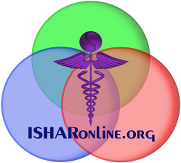Faith-Based > Prayer
List ISHAR Online Sources: Faith-Based > Prayer
Functional Summary
|
Modality |
|
An individual or group prays for the health or medical procedure of another person/people, in the hopes that some sort of divine force or entity will come to their aid. |
|
Intention |
|
The entreated upon force or entity will use their divine powers to miraculously heal, or aid doctors in healing whatever is wrong with the individual/group being prayed for. |
|
Geo-Cultural |
|
Most major religions implement prayer to augment healing. |
Topic Summary
Most major religions involve some form of prayer, whether it involves Muslims, Hindus, Jews, or Christians. Needless to say, it is a system that has existed more or less globally for many millennia. A very common reason for prayer is for illness. Many religious people will pray for the help of their deity or some divine force to intervene and heal another.
However, prayer-based healing does not consist of simply asking for miraculous events. Prayer is often used as a complementary form of medicine alongside modern treatment. Those praying will often not only ask for divine intervention directly on the illness, but will ask for the doctor to be enhanced spiritually in wisdom and skill to achieve the best procedural outcome.
Even outside of religious circles, prayer-based healing is beginning to be looked at as a potentially helpful complementary medical practice. Studies have shown that prayer of any kind elicits a relaxation response helpful for successful healing. Prayer groups may also give patients the feeling of being supported.
Research Summary
Because of the blatantly spiritual nature of this form of complementary medicine, research is only just in its infancy. There have however, been studies which have shown that religious people who regularly attend church generally live healthier lives in general, or recover more quickly from medical or psychological illnesses. Though, it is difficult to determine whether church-going actually plays any kind of active roll, as correlation does not necessarily mean causation. In 1988, results of a study was published which looked at the effects of prayer on statistically inseparable cardiac patients, and found that those who received prayer fared dramatically better than those that did not. A later study released in 2006 looked at the same thing, but on a much larger scale, and actually found that the prayers of strangers for the recovery of heart surgery patients had no effect, and patients who knew they were being prayed for en masse actually had a higher rate of post-operative complications. As referenced above, most studies conclude that further research and review is required before assessing the practical applications of prayer.
Perspectives
ISHAR strives to present all of our data in an impartial, informative manner. Nonetheless, there are always different viewpoints on various topics, and ISHAR encourages users to review the perspectives on other informational sites, then come to their own conclusions regarding what they consider the least biased. The sites below were chosen to represent a wide spectrum of approaches to this topic, and none are endorsed or promoted by ISHAR itself.
Wikipedia: http://en.wikipedia.org/wiki/Faith_healing
WebMD: http://www.webmd.com/balance/features/can-prayer-heal?page=4
A Pro-Practice Website: https://nccih.nih.gov/training/videolectures/8/5
An Anti-Practice Website: http://www.quackwatch.com/01QuackeryRelatedTopics/faith.html
